-
Iran received secret exemptions from complying with some facets of nuclear deal
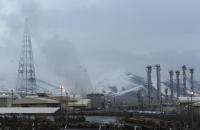
The nuclear deal between the P5+1 powers and Iran – the official named is the Joint Comprehensive Plan of Action (JCPOA) — placed detailed limitations on facets of Iran’s nuclear program that needed to be met by Implementation Day, which took place on 16 January 2016. Most of the conditions were met by Iran, but some nuclear stocks and facilities were not in accordance with JCPOA limits on Implementation Day. In anticipation, the Joint Commission had earlier and secretly exempted them from the JCPOA limits. “Since the JCPOA is public, any rationale for keeping these exemptions secret appears unjustified,” say two experts. “Moreover, the Joint Commission’s secretive decision making process risks advantaging Iran by allowing it to try to systematically weaken the JCPOA. It appears to be succeeding in several key areas.”
-
-
North Korea creates specials nuclear backpack units to infiltrate the South
North Korea has established a special infantry unit whose soldiers are being trained for a one-way mission: in the event of war with South Korea, they will infiltrate the South carrying nuclear devices in backpacks and detonate their weapons in the middle of population centers. North Korean military issued calls to the nation’s soldiers to become human “nuclear arsenals” in the event of war in the region. Military analysts said the units are, in effect, suicide squads, resembling the Japanese kamikaze pilots sent to attack Allied warships toward the end of the Second World War.
-
-
Former senior Obama official: Inaction in Syria result of desire to keep Iran deal alive
The White House’s failure to stop the ongoing slaughter perpetrated by the Syrian regime of Bashar al-Assad stems from President Barack Obama’s “desire to accommodate Iran” so that last year’s nuclear deal will extend past his administration, the president’s former top Syria adviser charged.
-
-
Looking from space for nuclear detonations

Sandia has been in the business of nuclear detonation detection for more than fifty years, starting with the 1963 launch of the first of twelve U.S. Vela satellites to detect atmospheric nuclear testing and verify compliance with the Limited Test Ban Treaty of 1963 and subsequently the Threshold Test Ban Treaty of 1974. That marked the start of the U.S. Nuclear Detonation Detection System that supports treaty monitoring. The Global Burst Detection (GBD) system launched 5 February from Cape Canaveral aboard the 70th Global Positioning System (GPS) satellite. The GBD looks for nuclear detonations around the world, offering real-time information about potential activity to U.S. policymakers. The launch was the 12th and final of the Block IIF (GPSIIF) series of GPS satellites in medium Earth orbit.
-
-
Iran threatened to halt nuke talks if U.S. bombed Assad, WSJ reporter says
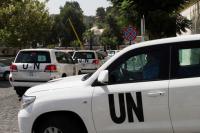
President Barack Obama changed his mind about launching a retaliatory strike against Syrian President Bashar al-Assad, whose forces carried out a sarin gas attack that killed more than 1,400 people in August 2013, after Iran threatened to pull out of then-secret nuclear talks, the chief foreign correspondent for the Wall Street Journal said on Monday.
-
-
Secret side deal cuts Iran’s breakout time in half in little more than a decade
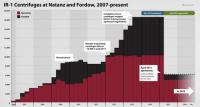
Key restrictions on Iran’s nuclear program will ease in slightly more than a decade, cutting in half the time Iran would need to build a nuclear weapons. The AP had obtained a document from a source inside the IAEA — a document which was the only secret portion to last year’s agreement between Iran and the P5+1 powers. The document said that after a period of between eleven to thirteen years, Iran could replace its 5,060 older, and inefficient, centrifuges with up to 3,500 advanced centrifuges.
-
-
Senators supporting Iran nuclear deal urging greater transparency in reporting on Iran’s nuclear program
Senator Gary Peters ((D-Michigan) on Friday led fourteen of his colleagues in sending a letter to President Barack Obama urging the administration to work with the International Atomic Energy Agency (IAEA) to encourage additional transparency when reporting on Iran’s nuclear program.
-
-
White House: Uranium discovered by IAEA likely tied to Iran’s nuclear weapons program

Obama administration officials concluded that particles of uranium found at Iran’s Parchin military base and revealed in the International Atomic Energy Agency’s final report on the country’s past nuclear activities were likely tied to the regime’s nuclear weapons program. The admission further underscores concerns that the IAEA’s investigation into Iran’s nuclear activities at Parchin should not have been closed following the report’s publication.
-
-
FARC to free last child soldiers
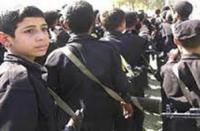
The FARC, Colombia’s largest rebel group, has said it will release all child soldiers under 15 years of age, thus ending an especially poignant chapter in the country’s 5-decade conflict. The FARC announcement comes as the negotiations between the rebel group and the Colombian government are continuing in Havana under the auspices of the UN. FARC made extensive use of children between 8 and 16 – what the organization called “pisa suaves” – to sneak into military camps, police stations, and other government facilities to set bombs and other types of booby traps.
-
-
ISIS obtaining nuclear weapons “obviously a concern”: British defense secretary

British defense secretary Michael Fallon said the prospect of ISIS or another terror group with the “technical know-how” obtaining nuclear weapons is “obviously a concern.” Fallon said it was important to ensure that terror groups could not “get their hands on nuclear weapons” and said the United Kingdom was doing its part by maintaining strict export controls on the necessary technology.
-
-
Ending civilian use of highly enriched, weapon-grade uranium
Efforts to convert civilian research reactors from weapon-grade highly enriched uranium (HEU) to low enriched uranium (LEU) fuels are taking significantly longer than anticipated, says a report from the National Academies of Sciences. The report calls for the federal government to take immediate steps to convert civilian research reactors currently using weapon-grade HEU fuel to a lower-enriched HEU fuel while awaiting the qualification of new LEU fuel.
-
-
Iran nuclear deal: how to ensure compliance?
The U.S. and European countries lifted nuclear-related sanctions against Iran on 16 January as part of a deal in which the country agreed to limit its nuclear activities and accept a new system of international inspections. The issue now is how the international community can be confident that Iran is not violating the deal. Iran agreed never to develop nuclear weapons when it signed the Nuclear Non-Proliferation Treaty in 1968. There’s no ironclad method to prevent Iran from breaking its promise and developing nuclear weapons, but this new agreement builds in a number of strong protections. In conjunction with U.S. and allied intelligence capabilities, these rules mean even a sophisticated and carefully executed secret plan would carry a high risk of detection.Looking at the deal as a whole, Iran’s best strategy for acquiring nuclear weapons would simply be to wait for restrictions on its declared enrichment program to be lifted. Assuming that the deal does not fall apart sooner, most of those provisions are scheduled to expire in 2030. In the meantime, the deal helps make a nuclear-armed Iran a less immediate prospect.
-
-
It is 3 minutes to midnight -- still

The Bulletin of the Atomic Scientists yesterday announced that the minute hand of the Bulletin’s closely watched Doomsday Clock will remain at three minutes to midnight, since recent progress in the Iran nuclear agreement and the Paris climate accord “constitute only small bright spots in a darker world situation full of potential for catastrophe.” The Bulletin’s panel of security experts said that “Three minutes (to midnight) is too close. Far too close…” – but that this reflects “world leaders continue to fail to focus their efforts and the world’s attention on reducing the extreme danger posed by nuclear weapons and climate change. When we call these dangers existential, that is exactly what we mean: They threaten the very existence of civilization and therefore should be the first order of business for leaders who care about their constituents and their countries.”
-
-
Iran decommissions Arak nuclear reactor
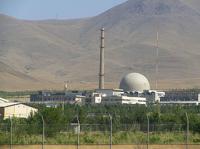
Iran has decommissioned its Arak nuclear reactor by removing the sensitive core, and UN inspectors are inspecting the reactor today (Thursday) in order to verify the removal of the core, as required by the nuclear agreement between Iran and the P5+1 powers. The removal of the core of the reactor will make it impossible for Iran to pursue the plutonium path to the bomb. The dismantling of about 13,000 uranium enrichment centrifuges, as called for by the agreement, will make it impossible for Iran to use enriched uranium to build a bomb for the duration of the agreement.
-
-
Seismologists "hear" the nuclear explosions in North Korea
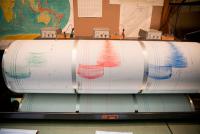
International experts are far from convinced that North Korea actually conducted its first H-bomb test, which was reported by the country last week.Seismology alone cannot tell whether it was a hydrogen bomb or not, but seismologists say that what emerges from the existing data is that last week’s seismic events in North Korea were slightly smaller than a similar event in 2013.
-
- All
- Regional
- Water
- Biometrics
- Borders/Immig
- Business
- Cybersecurity
- Detection
- Disasters
- Government
- Infrastructure
- International
- Public health
- Public Safety
- Communication interoperabillity
- Emergency services
- Emergency medical services
- Fire
- First response
- IEDs
- Law Enforcement
- Law Enforcement Technology
- Military technology
- Nonlethal weapons
- Nuclear weapons
- Personal protection equipment
- Police
- Notification /alert systems
- Situational awareness
- Weapons systems
- Sci-Tech
- Sector Reports
- Surveillance
- Transportation
Advertising & Marketing: advertise@newswirepubs.com
Editorial: editor@newswirepubs.com
General: info@newswirepubs.com
2010-2011 © News Wire Publications, LLC News Wire Publications, LLC
220 Old Country Road | Suite 200 | Mineola | New York | 11501
Permissions and Policies
Editorial: editor@newswirepubs.com
General: info@newswirepubs.com
2010-2011 © News Wire Publications, LLC News Wire Publications, LLC
220 Old Country Road | Suite 200 | Mineola | New York | 11501
Permissions and Policies
